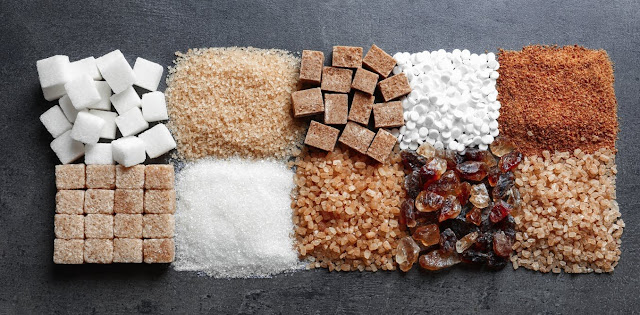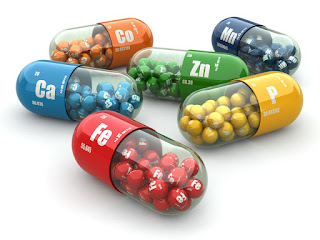Are Artificial Sweeteners Safe?
Image source: Pitlick, 2019.
For my second entry on this blog I have decided to look into the potential toxicity of sucrose replacements, better known as ‘artificial sweeteners.’ These sweeteners are incredibly prevalent in any sort of processed foods, and while they have been a boon to people such as diabetics who otherwise may be limited in the types of foods they can eat, they also carry risks. In fact, food and drinks containing aspartame flat out carry a mandated warning for people suffering from phenylketonuria. So even in the absence of underlying health concerns, are these sweeteners safe? Are they safe, but only in certain amounts? And is there any evidence that artificial sweeteners are neurotoxins?
For my second entry on this blog I have decided to look into the potential toxicity of sucrose replacements, better known as ‘artificial sweeteners.’ These sweeteners are incredibly prevalent in any sort of processed foods, and while they have been a boon to people such as diabetics who otherwise may be limited in the types of foods they can eat, they also carry risks. In fact, food and drinks containing aspartame flat out carry a mandated warning for people suffering from phenylketonuria. So even in the absence of underlying health concerns, are these sweeteners safe? Are they safe, but only in certain amounts? And is there any evidence that artificial sweeteners are neurotoxins?
There is an enormous amount of research available
online relating to the safety of sugar replacements. To summarize it would be
difficult, so I encourage anyone interested in the topic to look through
scholarly articles and make decisions for your own diet. In the interest of brevity, I have
highlighted a couple of the more commonly used artificial sweeteners below.
Image source: Whitehouse et al., 2008.
SACCHARIN:
The U.S. Food and Drug Administration has deemed saccharin
safe for consumption as it is not metabolized or absorbed by the body and is
excreted by way of the kidneys (Whitehouse et al., 2008). However, one of the
leading articles on potential toxicity notes that a 1983 study on saccharine
resulted in a contemplated ban of the substance in the United States, but this
idea was abandoned in 1991 in favor of a warning label. (Whitehouse et al.,
2008) The labeling included language that stated “saccharin is a potential cancer
causing agent,” (Whitehouse et al., 2008), but this language was discontinued
in 2000. Studies seem to show an increase in bladder cancer when lab rats were
exposed to diets comprised of 5-7% saccharin, particularly in males (Whitehouse
et al., 2008). A mid-1990s study showed a correlated between saccharin
ingestion and elevated liver enzymes and liver damage. (Whitehouse et al., 2008).
ASPARTAME:
Aspartame seems to have a reputation as one of the
more controversial artificial sweeteners in use. Anyone who has read a
nutrition label on items such as no calorie flavored sparkling water may have
noticed a warning label for people diagnosed with phenylketonuria that the
product contains phenylalanine. This warning is imperative for anyone who has
the genetic disorder, as they lack the enzyme phenylalanine hydroxylase which
breaks down the amino acid. (Whitehouse et al., 2008). If the amino acid builds
up in the body too much, it can disrupt normal neurological functioning, and in
children it can cause severe brain damage (Whitehouse et al., 2008). The product is included in innumerable foods
and beverages, as “it has been hypothesized that neither aspartame nor its components
accumulates in the body.” (Whitehouse et al., 2008). However, when studied, naturally
occurring phenylalanine levels “doubled within an hour and returned to baseline
in 4 hours.” (Whitehouse et al., 2008).
One of the major research studies on aspartame
toxicity was completed in 2007, and found a “significant dose-related increase
of malignant tumor[s] in males … a significant increase in incidence of lymphomas/leukemias
in males … and a significant dose-related increase in incidence of lymphomas/leukemias
in females…” as well as “a significant dose-related increase in incidence of
mammary cancer in females.” (Soffritti et al., 2007). What is particularly
shocking about the Soffritti study is the researchers’ conclusion that the
carcinogenic potential of aspartame was found in levels that were close to the Acceptable
Daily Intake (ADI), and even worse, “when life-span exposure to APM begins during
fetal life, its carcinogenic effects are increased.” (Soffritti
et al., 2007, emphasis added).
The risks that aspartame may pose continue well through
life. A 2014 National Institutes of Health study found that “frequent
consumption of sweetened beverages, especially diet drinks, may increase
depression risk among older adults.” (Greger, 2016). Dr. Michael Greger writes
on the Nutrition Facts.org site that aspartame “may modulate brain neurotransmitters
such as dopamine and serotonin, although data have been controversial and
inconsistent.” (Greger, 2016).
For nearly every food additive, there may be research both praising its safety, as well as contrary research that warns of potential dangers. Suffice it to say, I come away from my cursory review of the various scholarly research papers below very much opposed to the inclusion of artificial sweeteners in my own diet, and while I have already attempted to stringently limit its intake for my young child, I will be even more vigilant going forward.
CITATIONS and ADDITIONAL READING TO CONSIDER:
- Whitehouse, Christina R., et al. “The Potential Toxicity of Artificial Sweeteners.” AAOHN Journal, vol. 56, no. 6, June 2008, pp. 251–261., doi:10.1177/216507990805600604.
- Soffritti, Morando, et al. “Life-Span Exposure to Low Doses of Aspartame Beginning during Prenatal Life Increases Cancer Effects in Rats.” Environmental Health Perspectives, vol. 115, no. 9, 2007, pp. 1293–1297., doi:10.1289/ehp.10271.
- Soffritti, Morando. “Carcinogenicity of Aspartame: Soffritti Responds.” Environmental Health Perspectives, National Institute of Environmental Health Sciences, June 2008, www.ncbi.nlm.nih.gov/pmc/articles/PMC2430255/.
- Greger, Michael. “Side-Effects of Aspartame on the Brain.” NutritionFacts.org, 1 Sept. 2016, nutritionfacts.org/2016/09/01/side-effects-of-aspartame-on-the-brain/.
- Maher, T J, and R J Wurtman. “Possible Neurologic Effects of Aspartame, a Widely Used Food Additive.” Environmental Health Perspectives, vol. 75, 1987, pp. 53–57., doi:10.1289/ehp.877553.
- Guo, Xuguang, et al. “Sweetened Beverages, Coffee, and Tea and Depression Risk among Older US Adults.” PLoS ONE, vol. 9, no. 4, 17 Apr. 2014, doi:10.1371/journal.pone.0094715.
- Pitlick, Jamie. “Sugar Substitutes: Is One Better or Worse for Diabetes? For Weight Loss? An Expert Explains.” Medical Xpress - Medical Research Advances and Health News, Medical Xpress, 1 July 2019, medicalxpress.com/news/2019-07-sugar-substitutes-worse-diabetes-weight.html.
- Whitehouse, Christina R., et al. “The Potential Toxicity of Artificial Sweeteners.” AAOHN Journal, vol. 56, no. 6, June 2008, pp. 251–261., doi:10.1177/216507990805600604.
- Soffritti, Morando, et al. “Life-Span Exposure to Low Doses of Aspartame Beginning during Prenatal Life Increases Cancer Effects in Rats.” Environmental Health Perspectives, vol. 115, no. 9, 2007, pp. 1293–1297., doi:10.1289/ehp.10271.
- Soffritti, Morando. “Carcinogenicity of Aspartame: Soffritti Responds.” Environmental Health Perspectives, National Institute of Environmental Health Sciences, June 2008, www.ncbi.nlm.nih.gov/pmc/articles/PMC2430255/.
- Greger, Michael. “Side-Effects of Aspartame on the Brain.” NutritionFacts.org, 1 Sept. 2016, nutritionfacts.org/2016/09/01/side-effects-of-aspartame-on-the-brain/.
- Maher, T J, and R J Wurtman. “Possible Neurologic Effects of Aspartame, a Widely Used Food Additive.” Environmental Health Perspectives, vol. 75, 1987, pp. 53–57., doi:10.1289/ehp.877553.
- Guo, Xuguang, et al. “Sweetened Beverages, Coffee, and Tea and Depression Risk among Older US Adults.” PLoS ONE, vol. 9, no. 4, 17 Apr. 2014, doi:10.1371/journal.pone.0094715.
- Pitlick, Jamie. “Sugar Substitutes: Is One Better or Worse for Diabetes? For Weight Loss? An Expert Explains.” Medical Xpress - Medical Research Advances and Health News, Medical Xpress, 1 July 2019, medicalxpress.com/news/2019-07-sugar-substitutes-worse-diabetes-weight.html.




Comments
Post a Comment